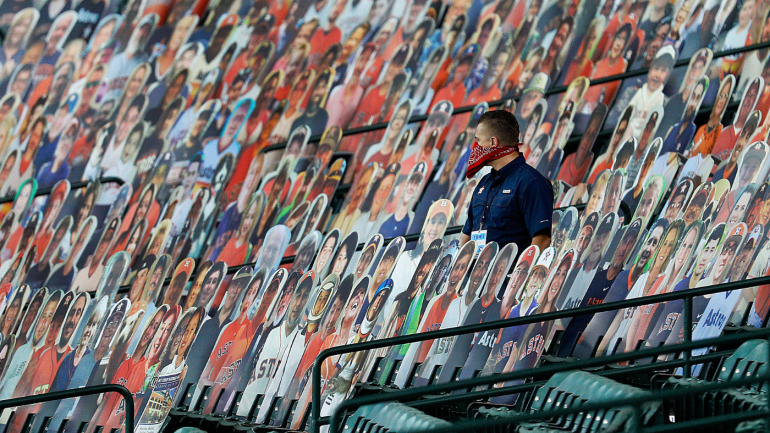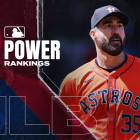
A former front office type, who had been a senior member of an analytics department, recently recalled when he decided to leave the baseball industry. It was right after he returned home from spring training, which had been shuttered in mid-March in response to the COVID-19 pandemic. "I started preparing my résumé that weekend," he said. "I got home and was like, 'I'm going to dust off the old thing.'" By the time the season started nearly four months later, he had escaped to an industry situated on firmer ground than that under Major League Baseball's cleats.
He's one of countless individuals who departed the industry this summer. Some exits, like his, were voluntary; many were not, and were instead the result of sweeping layoffs. Even now, as the expanded playoffs continue, teams continue making cuts to their scouting and player development staffs. The upcoming winter is not expected to be kind. Teams will be steeling themselves for the second of potentially three compromised seasons in a row: two because of the pandemic, one because of a work stoppage. In 10 years' time this stretch could be viewed as the beginning of a transformative period for the industry, and specifically for front offices.
Since the beginning of August, CBS Sports has broached the possibility of a brain drain in baseball with a dozen individuals who either work in or worked in the industry before leaving this year. These individuals hail from various backgrounds and occupy different front-office roles, be it scout, analyst, or fancier titles. In theory, a consensus on anything should be unlikely; in practice, they agree on this much: if the brain drain is underway, the coronavirus isn't the only catalyst behind it.
To be certain, the pandemic has helped reshape MLB in numerous ways. The expanded playoffs, supposedly a mechanism to counter the unbalanced schedules and shortened season, are a surefire moneymaker with support at the ownership level. At least some of the rule changes, especially those designed to encourage offense, are likely to stick around. The scouting and coaching staffing cuts hint that the draft and minor leagues, each minimized this season for logistical purposes, will be reduced in scale on a permanent basis. And so on.
It's important to make a distinction between what the pandemic willed into existence, and what it merely hastened the arrival of. All the changes, from the bloated playoffs to the streamlined development system and in between, are concepts that predate the ongoing global pandemic. The looming shifts at the front-office level should be viewed using a similar framework: COVID-19 accelerated an event that was likely to occur anyway. "It's less about COVID being a reason, it's more about all the reasons before COVID," the former senior member of an analytics department said. "This was just the straw -- the very heavy straw -- that broke the camel's back."
All the reasons before COVID include poor pay; a lack of upward mobility; a lack of feeling valued; a gatekeeping system that still resembles an old boys club (even if the "old boys" are different than they used to be); and the likelihood that, at some point, the Cult of Efficiency will shift its gaze away from the clubhouses and the dugouts and toward the front offices.
At stake is the loss of institutional knowledge; further deterioration of working conditions and attempts at improving diversity; and the continued development of the sport and its strategies. "You're losing a lot of relationships, not only within the industry and then within an organization, but you're also losing relationships as far as bringing in talented folks who may not have seen sports analytics as a career," said a different front office member who left his post this summer. "It's a brain drain, and that feedback loop is being lost because you don't have people coming from different walks of life or other industries, bringing in their ingenuity in that 'Moneyball' way: you did something in economics, how can that apply to baseball?
"A lot of those unorthodox relationships and pipelines toward doing something different, to gain a competitive advantage, are going to go away. It's going to really stagnate the game."
The accepted principle in thermodynamics is that materials expand when they're heated and contract when they're cooled. Industries working in a similar manner. They hire and attract more individuals when they're doing well, and they hire and attract fewer individuals when they're not. Baseball, an entertainment industry at heart, operates under more inelastic conditions. People always want in, and that's because of the emotional attachment they feel toward the game that cannot be applied to other industries, like marketing or accounting.
For as long as baseball is considered a desirable career path, there will be a surplus of individuals willing to submit themselves to the industry's long hours and poor pay. The teams wield the overflowing candidate pool as leverage to maintain the status quo, even as job requirements grow more extensive and exclusive. The most sought after credentials these days, particularly on the analytical and programming sides, are transferable skills that would result in greater pay and job security in other industries. Sacrificing in those arenas is both a well-known and widely accepted tradeoff for living out the dream of working in the baseball industry.
Those individuals are now taking hits in other areas. Front offices have expanded in the nearly two decades since the "Moneyball" days. Departments now serve as silos, with each containing inner circles. As the number of individuals has grown, the weight of input from any given individual has declined. "Before, you had small front offices and everyone got to participate in those conversations," an active front office member said. "Now, you have big front offices with tons of information and you need all that information to be distilled. You can't just be like, 'let's hear from every single analyst on what they think.' You just don't have time for that."
In turn, the finite number of organizations and the seemingly infinite number of hires has created a bottleneck effect. An individual can get their foot in the door, but that doesn't mean they'll advance beyond the foyer. The rate of desired growth from those individuals often outpaces the rate of opportunity the team hands them. That equation can lead to disenchantment during the best of times, and these are far from the best of times.
The former senior member of an analytics department said that his team held several meetings in the weeks after the shutdown. Those calls featured higher-ups bemoaning the organization's financial state, and explaining that the loss of in-market revenue -- its most profitable arm -- necessitated pay cuts and furloughs. Money is and will always be a tricky topic in baseball, where budgets are guided like proprietary metrics. Even before the pandemic, he said his department never knew if a request would be approved until they received the verdict. The lack of transparency rubbed him wrong. He wondered if the team was forthcoming about its shortfalls, or if it was overstating the losses.
Paranoia and distrust among employees is nothing new, but the COVID-19 era has introduced several wrinkles that exacerbate the situation. The lack of face-to-face interaction, or in-person camaraderie, can leave individuals feeling more isolated than they would normally. There's also the fear that more cuts await around the next turn, and the skepticism that teams are cooking the books. "It's an industry that really plays on anxieties and uncertainties," another former front office member said.
The obvious conditions for an industry-wide brain drain are being met: employees are feeling less valued; they're being compensated worse; they're not enjoying the social or psychic benefits of their jobs; they're having to worry about their job security, and if other teams will be hiring this winter; and so on. It's a lot to manage, and it's no wonder why some sources who are still in baseball admitted they had contemplated making moves to different, less-altered industries.
"The retention rate is going to be lower," the former senior analytics member said, "not the acquisition rate -- the acquisition rate is probably going to be the same, in terms of analytics and smart people and whatever -- but the retention rate is going to be abysmal in the end." Put another way: MLB might retain its supply of youngsters who don't know any better, but those who have lived the life and have options elsewhere seem more likely than ever to walk away.

There's no rule that states a brain drain must have only negative ramifications. Senior members migrating to other fields should create space and free up power for junior staffers. Those newcomers, blessed with fresh eyes, can deal in novel ideas that weren't embraced by the old guard. This sequence is most likely to occur, and to result in growth, when front offices resemble society rather than an army of clones with similar credentials, experiences, and outlooks.
MLB has never proved it values anyone other than straight white men. The evidence is in the embarrassing lack of diversity throughout the game, beginning with the topline numbers. As of season's end, teams employed seven non-white managers (including Lloyd McClendon, the Detroit Tigers' interim skipper); two non-white general managers; and two non-white scouting directors. Other, less publicized gatekeeping roles have similarly white-leaning breakdowns.
The individuals who fill those roles fall victim to the same implicit biases: they gravitate toward people who look like, talk like, and act like them; who, in effect, remind them of themselves. It's another manifestation of risk aversion. (One source joked that the attribute shared by everyone in the industry is risk aversion, not a passion for the game.) These biases have been proven time and again, in baseball and elsewhere. To wit, a 2003 study conducted by MIT and University of Chicago researchers found that résumés submitted with white-sounding names received responses at a greater frequency than when the same résumés were submitted with non-white-sounding names. The researchers also found that "candidates with superior credentials" who had white-sounding names "received 30 percent more callbacks;" the same wasn't true of non-white names, suggesting the bias has nothing to do with credentials.
MLB has attempted to address its inequality problems in small ways, such as creating pipeline programs. For instance, individuals deemed diversity fellows are paid more than $50,000 and are guaranteed at least 18 months of employment. Those conditions are significantly better than the ones associated with internships, and the fellows don't have to compete against folks who are more likely to serve as a mirror for gatekeepers. The fellowship program's pay and job security enables individuals from less-privileged backgrounds an honest chance at a career in baseball -- something they might have otherwise given the socioeconomic dynamics at play.
"If you are coming from a disadvantaged background and you want to do this for a living, it's really against you. Not only because of those connections in those networks, but let's say I personally say we'd love to have you, come on down," a former front office member said. "Oh, by the way, you're getting paid minimum wage. Oh, by the way, you need to move to a major metropolitan area, and find some place to live. And oh, by the way, we also expect you to not only work a full day but also sometimes there are situations where you skirt some of the the laws and rules and say, 'all right, you know, you're supposed to work 40 hours, we need you to work 48 because you have to do something or work on a Saturday or what happened, because that's the nature of the game. And that plays into people's anxieties: if I don't show up Saturday, does that mean I'm done? Does that mean my dream is over before I even get a chance to start?"
There is concern inside the industry that the economic downturn will impact the inclusivity efforts. One source quipped that at least the league is likely to maintain their diversity programs. Teams might opt to reduce their efforts in the name of saving money. That sounds ridiculous, but bear in mind that teams are making cuts in the scouting and player development departments, or two areas still accessible to non-white former players. If teams reduce pay heading forward (and, to be fair, multiple teams are known to be on board with restoring pay, even before the suspension on the universal employee contract is lifted) that could force the pendulum further to the side of privileged individuals who come from well-off families able to offer financial support.
Without a spirited intent to improve MLB's diversity problems, there's reason to think a backslide could be coming alongside the brain drain. "Implicit bias is too strong to assume that people are going to make business decisions in an objectively non-biased way," the former senior analytics member said. "There's a reason we have terms and departments and programs for this stuff, because we realize we can't beat implicit bias unless we are actively trying to weed it out."
The unspoken part about the potential brain drain is that it may have happened regardless of the pandemic. MLB teams are wont to copy what works. That can mean investing in analytics, it can mean beefing up a bullpen, or it can mean modeling a front office after the Houston Astros by instituting a philosophy that states efficiency is the only king worthy of servitude.
Former Astros general manager Jeff Luhnow worked for McKinsey & Company, a notorious business management consulting firm, before getting his start in baseball with the St. Louis Cardinals. True to his past, he kept his Houston front offices lean. That entailed smaller staff sizes, and a turnover rate perceived to be higher than usual. He applied his efficiency bent to the Astros' scouting and development arms, too. One former Astros staffer described the club's dependency on video scouting: "If that means just firing everyone, putting five people in front of computers, and saying, 'tell me if this guy is any good,' then they're going to do it."
It may sound outlandish to suggest the league would embrace the practices and philosophies of someone who was suspended by the league for involvement in the sign-stealing scandal, but take a look around. The new vision for the minors that the league is proceeding with originated with Luhnow. His disciples are now spread across the sport in various positions of power: David Stearns runs the Milwaukee Brewers, while Mike Fast and Colin Wyers are with the Atlanta Braves. Then there's the Baltimore Orioles, who are being guided by Mike Elias and Sig Mejdal. The Orioles, more so than any other franchise, appear to be following the Luhnow blueprint.
"You take a look at their minor-league system and they're doing what the Astros did," the former senior analytics member said. "They have very few coaches. They're moving more towards that roving coordinator-type model, where one very smart coach can do the job of three coaches. They keep their staff sizes pretty tiny, and that's because they're trying to, on one side, save a lot of money, but on the other side, grow people with a lot of experiential knowledge. So, when they do spend money in the long term, they have a lot of experienced, established people there who feel like they've grown with the team. They treat it much like a startup."
The Orioles' internal budgets are unknown, though they have mirrored Luhnow in some important ways: improving their analytical and technological infrastructure, and shying away from spending money at the big-league level until it's necessary to compete. Over Elias' first two seasons in Baltimore, the Orioles' payroll has been the 28th highest on average; prior to his arrival, the Orioles' payroll had not ranked lower than 16th in the majors since 2010.
The pandemic would seem to present teams with an opportunity to follow the Houston slash-and-burn model without endangering gate revenue. Yet some sources interviewed for this article believed the pandemic made further mimicking unlikely. The league as a whole appeared far more risk-averse in the draft and at the trade deadline, complicating things for a hopeful Luhnow since so much of the Astros' success stemmed from plucking undervalued players and getting the most developmentally from them. (Plus, to an unknown extent, underhanded methods.)
There's the human element to consider, too. Every team can plot ways to save money and to please their owner. Implementing those plans requires an uncommon coldness. "A lot of these teams are aware that not everyone is a f---ing robot," another active front office member said. "These people have bills; they have kids, families; they might have a pregnant wife; they might have kids going to college; they can't lose their job. A lot of these teams get that. I think the option might be kind of tempting, like, 'hey, we can fire this group, and we can save this, this, and that,' but at the end of the day, I think morality will be superior here."
Still, it takes only a few owners to steer their boats in a different direction. They could reason that baseball was played for a hundred years without front offices of this size; that their hordes of analysts, scouts, and instructors are luxury goods rather than essential personnel; that they could save money without sacrificing on-field results; and so on. If a team or three goes that route and finds success, then it stands to reason that other clubs will follow suit in due time -- no matter what studies say about the value each additional analyst brings to an organization.
"The thing is so much of this is driven by owners," a front office source said. "I cannot predict what an owner will do -- I just don't know how an owner's mind works."
However the next several years play out, it appears that the baseball industry is in a liminal space. Front office gigs, long glamorized, have become less desirable to those with options. The individuals who remain in the industry feel underpaid, undervalued, and overstressed. The most conscientious are concerned that an already exclusive industry is going to build larger gates, and become more homogenous and bland because of misplaced priorities. The industry, then, is in a bad place -- and it might remain there for the foreseeable future.
"A lot of people call it their dream job," the former senior analytics member said. "This was one of those things that makes you realize that a dream job sometimes is still a dream."






















